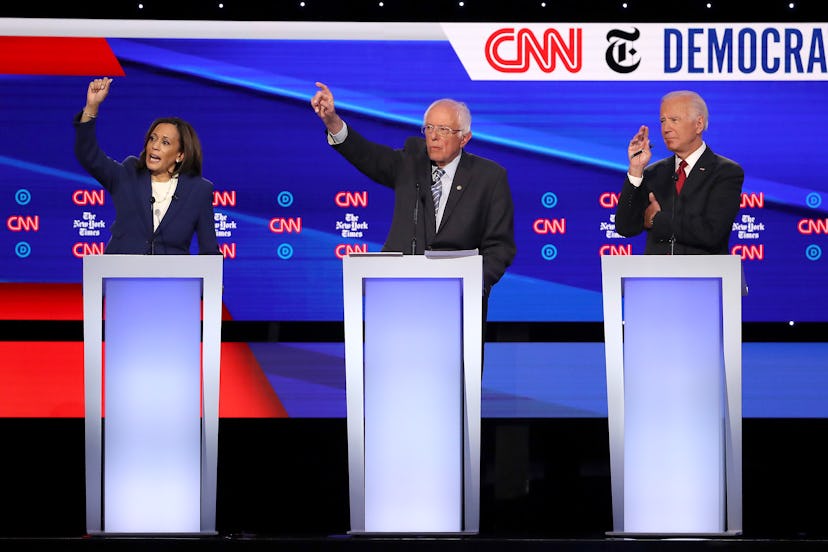It’s Time to Start Asking Candidates Better Questions in the Presidential Debates

On Tuesday night in Ohio, a whopping 12 candidates crowded the stage of yet another packed Democratic presidential debate. Naturally, none of them seemed pleased with the amount of attention that they received; Cory Booker at one point cheekily acknowledged as much, thanking the moderators for allowing him to speak. Kamala Harris, on the other hand, had a different bone to pick: “This is the sixth debate we have had in this presidential cycle. And not nearly one word, with all of these discussions about health care, on women’s access to reproductive health care, which is under full-on attack in America today,” she said.
“It’s outrageous. It’s not an exaggeration to say women will die because these Republican legislatures in these various states who are out of touch with America are telling women what to do with their bodies,” Harris continued, causing the crowd to break out into applause. (To his credit, Booker soon echoed Harris’s sentiment: “God bless Kamala. But you know what? Women should not be the only ones taking up this cause and this fight. It’s not just because women are our daughters and our friends and our wives. It’s because women are people.”)
Harris is, unfortunately, correct: There is currently a nationwide attack on the Supreme Court’s landmark 1973 ruling Roe v. Wade—one that directly affects the 166 million women living in America today (and arguably each and every one of the country’s total 327 million residents, too). Failure to mention such a relevant issue is a massive oversight—though unfortunately also the type of oversight that is endemic to American presidential debates.
That’s according to research by Time’s Up, the anti-harassment organization that more than 300 women, including celebrities like Shonda Rhimes and Meryl Streep, launched in the wake of the post-Harvey Weinstein reckoning, at the start of 2018. Ahead of this year’s election cycle, the group closely examined two decades’ worth of debates in the U.S., from 1996 to 2016—many of which were of course moderated by men who are white.
The lack of diversity among debate moderators might have something to do with why moderators notably failed to ask candidates about issues pertaining to women throughout that time, particularly when it comes to issues like child care, pay equity, sexual harassment, and paid leave. Of the 4,000 questions asked in the 123 debates held during those two decades, only eight addressed those topics. (Six of the eight were asked by women moderators.)
As for how many of those addressed candidates’ planned policies to address sexual harassment, that would be zero. Only three questions were related to sexual harassment in general. And yet, according to the Barbara Lee Family Foundation, 51 percent of voters say that they wouldn’t vote for someone who didn’t make addressing sexual harassment a priority.
Candidates have occasionally taken it upon themselves to raise such topics without prompting, though only around 20 have mentioned pay equity without being prompted. Of course, they’ve only been prompted on the issue twice, even though the statistics are staggering: Women in America are paid an average of 80 cents for every dollar paid to men. For Latinas, that number drops down all the way to 53 cents. So far this election cycle, there have been three questions about the pay gap—but zero about sexual harassment policy, child care, and paid medical and family leave.
It would be impossible to touch on every issue during a debate, particularly with such a crowded stage. But this time around, too much was left out. Over the course of three hours, not a single question was posed about the existential threat of climate change. Nor was there a single question about sexual harassment or pay equity, even though this is the first presidential election cycle since the #MeToo movement took off in 2017. Suffice to say, each is just one of the myriad issues infinitely worth discussing over the night’s final question of the name of a person with whom they have a surprising but impactful friendship, à la George W. Bush and Ellen DeGeneres. (Especially when two of the 12 candidates pointed to the same person: the late John McCain.)
Related: The Best Twitter Reactions to the Democratic Debate’s Second Night